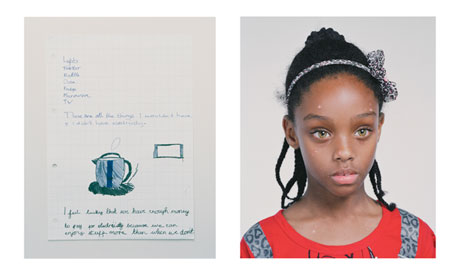To accompany Save the Children's first survey into poverty in the UK, award-winning photographer Spencer Murphy records the view from one east London borough


Amira, 8: "I feel lucky that we have enough money to pay for electricity because we can enjoy stuff more than when we don't." Photograph: Spencer Murphy/Save the Children
Their names are Claire, Billy, Amira, Sydnee, Trey. Regular east Londonkids, some of the many who came along to the Poplar Boys and Girls Youth Club in Tower Hamlets during two days in August to have their pictures taken, and to say what they thought child poverty in the UK was and how they felt about it.
Their portraits, by the award-winning photographer Spencer Murphy – whose shot of a soulful Mark Rylance was last week nominated for the National Portrait Gallery's Taylor Wessing prize – are frank, guileless and affecting. Their words, presented in diptych, are equally forceful.
Poverty, reckons Adam, means "not having the basic things to live, like food, clothes, education". For Sydnee, you realise someone "may not have as much money as others by the toys that they have, or they might not even have toys. Also by the clothes that they wear, or if their clothes and shoes etc may not fit them."
According to Save the Children, which commissioned the series to mark the publication of its first ever domestic appeal and survey of child poverty in the UK, Britain's poorest children are bearing the brunt of the recession and spending cuts, while families on modest incomes are increasingly struggling.
The report, based on interviews with 1,500 children and 5,000 parents, half of them in areas of high deprivation, found that one in eight of Britain's poorest children are going without at least one hot meal a day, and 43% had seen their parents cutting back on food and clothes.
Some 15% have to go without new shoes, 14% are denied a warm winter coat and 23% are missing out on school trips because parents cannot afford them. Nearly 30% of parents say they cannot afford to have their children's friend round for tea, and 10% of children cannot celebrate their birthdays.
The charity aims to raise £500,000 to help its work in the UK, and is calling on government to encourage more employers to pay the living wage, strengthen the new Universal Credit welfare system and help parents afford to work by providing extra child care support. Poverty, says Justin Forsyth, Save the Children's chief executive, "is tearing families apart".
More of Spencer Murphy's pictures will be published on the Save the Children website (savethechildren.org.uk/what-poverty-means) later this week.












No comments:
Post a Comment